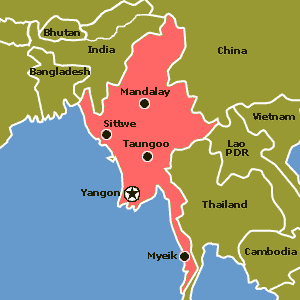Aung San Suu Kyi Set for Landslide Win in Historic Myanmar Election

According to preliminary results, the party of the Nobel Laureate may win up to 70 percent of parliamentary seats. The maximum they can win constitutionally is 75 percent. As the results of Myanmar’s first free elections elections trickled in, the ruling party conceded defeat to Aung San Suu Kyi’s party, which has already won more than enough votes to form a government.
The country is voting for its government for the first time in over 50 years, though a quarter of parliamentary seats are reserved for the military. Suu Kyi, who spent years under house arrest, cannot become president because she has children with foreign passports, but she said that she would influence the president regardless.
Her party, the National League of Democracy, or NLD, told Reuters that it won over 80 percent of the vote in densely populated areas and over 65 percent in two of the seven states. Voter turnout is estimated at about 80 percent, with no reported violence. The NLD, though, filed a complaint on a few voting irregularities. Still, the most powerful politicians have a week showing in the preliminary results. Some have not yet acknowledged the numbers.
NLD supporters rallied at its headquarters in Yangon gathered to cheer on the victory of their party, which has won 16 of the 17 parliamentary seats announced so far. The remaining 481 seats will be announced throughout the day until all official results are released at 6 p.m. local time.
Celebration at the NLD HQ in #Yangon #Myanmar as names of winners of Nov. 8 polls were announced. pic.twitter.com/wD9NRUaAsz
— Ted Regencia (@tedregencia) November 9, 2015
Another photo from the UEC’s results center in Rangoon, where Tin Aye’s press conference is being beamed in pic.twitter.com/tRMpG6B9EK
— The Irrawaddy (@IrrawaddyNews) November 9, 2015
However, one segment of the population that would not be taking part in Sunday’s election are Rohingya Muslims. A primarily Buddhist country, Myanmar denies its Muslim minority—numbering over 1.1 million people—citizenship and basic rights. Tens of thousands of Rohingya Muslims have fled Myanmar in recent years as a result of government-sanctioned repression, living as stateless people abroad. More than 140,000 are also internally displaced within Myanmar itself, the victims of widespread discrimination and violent mob attacks. Suu Kyi, winner of a Nobel Peace Prize, has been criticized for her relative silence concerning what human rights organizations call a campaign of ethnic cleansing by Myanmar’s Buddhist majority. Unwilling to alienate the majority, she has blamed “both sides” for violence.
Cover of state paper sure to give warm fuzzy feeling but pg inside sharp reminder of discrimination #burma #myanmar pic.twitter.com/k7jChnMccv
— Thin (@thinink) November 9, 2015
#Burma government crimes against Muslims civilians 11.207 person killed 3.253 woman raped 125.000 person fled pic.twitter.com/6FH7CVC7Qo
— #IRAQ شمرية العراق (@moonnor27) November 5, 2015

